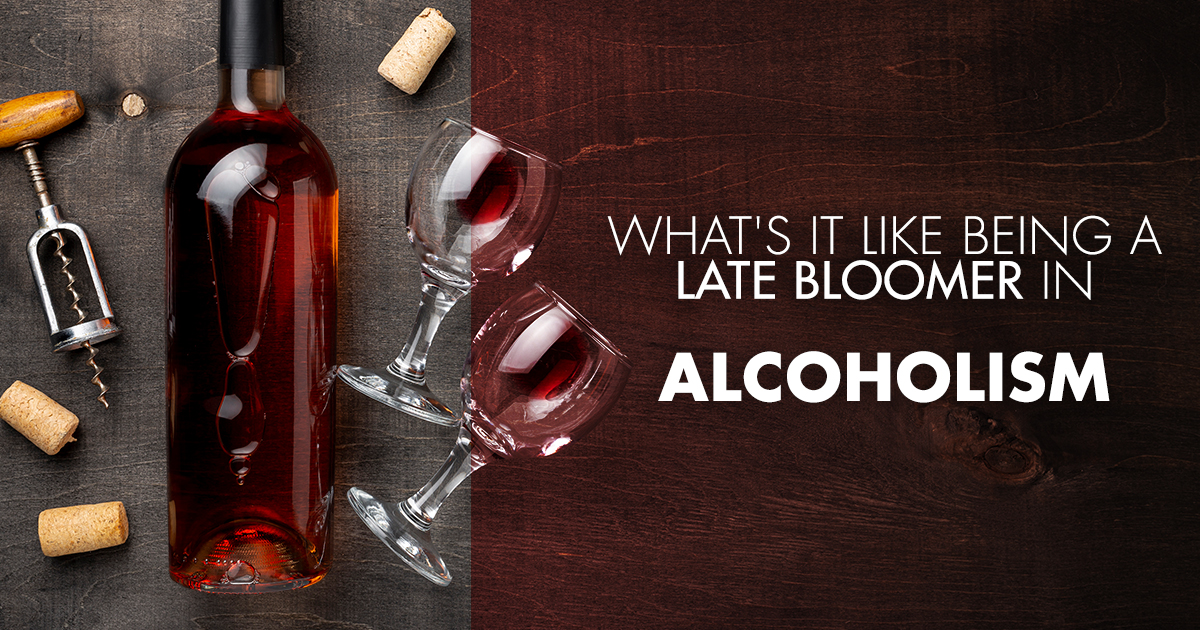
Are you an early bloomer or a late bloomer when it comes to alcoholism? You’ll know if you are a late bloomer because, after your early adulthood, you’ll start to have periods of heavy drinking.
What is a Late Bloomer?
A late bloomer in alcoholism is a person who drinks regularly but does not become an alcoholic until later in life (usually after the age of 30). The term “late bloomer” is commonly used to describe an individual who starts drinking at a later age than most of their peers. The reasoning is that the individual may have been abusing another substance, such as prescription drugs, and started drinking to cancel out their withdrawal symptoms. While it’s impossible to say whether or not somebody will become dependent on drugs as a late bloomer, there are definite risks associated with drinking for the first time in your 30s, 40s, and beyond.
The people who become alcoholics after their early adult years tend to experience more complications than younger drinkers. This disorder is becoming increasingly common. Approximately 60% of people with Substance Use Disorder develop their drinking problems after turning 30.
Late bloomers in the United States
The latest report by National Institute on Alcohol shows that the most severe cases of late bloomers in alcoholism in the United States were diagnosed between the ages of 35-39. The most prevalent form in males, with 46 cases identified during 2011, followed by females with 18 cases reported. Although very common globally, alcohol dependence has increased among late bloomers in alcoholism in the United States by 25%. As many people know, addiction is a progressive disease; that means that as the disease worsens and one continues to drink, more and more problems will occur.
The body of a late bloomer progresses through a series of stages that sometimes resemble those of the people who are addicted to liquor. Once an alcoholic has reached this point, significant physical, mental, and emotional changes occur, and as they progress, the person may not be able to recall these changes. This is due to the dilapidation of brain cells resulting in loss of memory, anxiety, depression, and other problems.
Risk Factors for Late Blooming Alcoholism
You are more likely to be a late bloomer if there is a genetic link (the risk of binge drinking increases the risk by 50% if there is a family history). You are more likely to be a late bloomer if you have a social environment that promotes heavy drinking. You’ll know if you are a late bloomer because you will have periods of heavy drinking that occur after your early adulthood. While genetics play a key role in problem drinking, environmental and social influences can also trigger alcoholism.
A few causes that result in being a late bloomer in alcoholism include:
- Losing a friend or closed one due to death, health problems, or moving away
- Loneliness due to Empty Nest Syndrome as the kids grow up and move away
- Poor health conditions
- Major life traumas, such as a close friend or spouse’s illness or death
- Experiencing boredom or lack of socialization after retiring from work
- Sadness due to a significant financial loss

Signs and symptoms of late bloomers
The late bloomer in alcoholism does not follow a distinct pattern of behavior; instead, the circumstances that lead to abuse and heavily consuming alcohol vary from person to person. A few common symptoms of alcoholism in the elderly include:
- Hiding the truth about the exact number of drinks consumed
- Drinking excessively to forget a loss or cope with anxiety
- Consuming with prescriptions and lying about medications
- Increased level of irritability over unimportant matters
- Stashing or hiding liquor bottles so nobody can find them
- Having slurred speech
Alcoholism can happen to anyone, and sometimes the earliest indicators may be missed or dismissed. Too often, people begin drinking alcohol too early or start drinking heavily when they’re very young. However, late bloomers start drinking after high school and college. While it’s sometimes harder than you realize to admit you have problems with alcohol and drugs, late bloomers need help from treatment facilities just like everyone else with addiction. If you think you are an alcoholic or suffer from any other substance abuse problems, contact one of our treatment counselors today.
Anchored Tides Recovery Center is specifically designed for women. Our goal is to provide every woman with the addiction treatment she requires for recovering from alcohol. There are several important components to our alcohol abuse and alcoholism treatment program. Call us today at 1-866-753-5865.




























